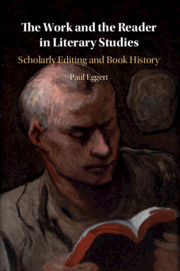Crossref Citations
This Book has been
cited by the following publications. This list is generated based on data provided by Crossref.
Baker, William
2021.
XVIII Bibliography, Textual Criticism, and Reference Works.
The Year's Work in English Studies,
Vol. 100,
Issue. 1,
p.
1307.
Sanfilippo, Emilio M.
2021.
Ontologies for information entities: State of the art and open challenges.
Applied Ontology,
Vol. 16,
Issue. 2,
p.
111.
Rendall, Edward B M
Smith, Peter J
Parsons, Elinor
Tarantino, Elisabetta
Stelzer, Emanuel
Bell, Shirley
Haworth, Ben
Lim, Vanessa
O’Brien, Sheilagh Ilona
and
Wilkinson, Kate
2021.
VII Shakespeare.
The Year's Work in English Studies,
Vol. 100,
Issue. 1,
p.
365.
Ward, Aengus
2022.
Of digital surrogates and immaterial objects: the (digital) future of the Iberian manuscript in textual editing.
Journal of Medieval Iberian Studies,
Vol. 14,
Issue. 1,
p.
41.
Subačius, Paulius V.
2022.
Tekstas kaip gyvatvorė.
Archivum Lithuanicum,
p.
9.
Kestemont, Mike
Karsdorp, Folgert
de Bruijn, Elisabeth
Driscoll, Matthew
Kapitan, Katarzyna A.
Ó Macháin, Pádraig
Sawyer, Daniel
Sleiderink, Remco
and
Chao, Anne
2022.
Forgotten books: The application of unseen species models to the survival of culture.
Science,
Vol. 375,
Issue. 6582,
p.
765.
Rodda, Martina Astrid
2023.
Antoine Meillet et la langue homérique: au-delà du «Parryisme»*.
Études de lettres,
Vol. 322,
Issue. ,
p.
43.
Hassan, Nurul Izzati
and
Ramlan, Wan Nur Madiha
2023.
Puteri Gunung Ledang in Popular Media: Womanhood, Femininity and Gender in Puteri Gunung Ledang (2004) and Magika (2010).
Malay Literature,
Vol. 36,
Issue. 1,
p.
65.
Battershill, Claire
Mukamal, Anna
and
Southworth, Helen
2024.
The Cambridge Companion to Literature in a Digital Age.
p.
107.
Beloborodova, Olga
and
Van Hulle, Dirk
2024.
Introduction.
Variants,
Vol. 17-18,
Issue. ,
p.
vii.
Eggert, Paul
2024.
A Comparative History of the Literary Draft in Europe.
Vol. XXXV,
Issue. ,
p.
141.
Warner, Lawrence
2024.
The Knots of
Sir Gawain and the Green Knight
’s Boar Chase (Lines 1431–7)
.
English Studies,
Vol. 105,
Issue. 7,
p.
1006.
Eggert, Paul
2024.
A Comparative History of the Literary Draft in Europe.
Vol. XXXV,
Issue. ,
p.
141.
Nutt-Kofoth, Rüdiger
2024.
Genetic Narratology.
p.
281.
Van Hulle, Dirk
2024.
Genetic Narratology.
Van Mierlo, Wim
2025.
Scholarly Editing in Perspective.



